Parents often conduct a lot of research before choosing a school for their child. During this stage, parents learn about a prospective school and determine whether or not it would be an excellent fit for their child. By applying techniques in SEO for private schools, you can ensure that your school is top of mind during the parent research process.
SEO is all about boosting your school’s awareness and online search visibility—two essential things as parents turn to online search engines for information about prospective schools. To appear in their search results and compel parents to click on your school website, you’ll want to apply the latest trends and industry best practices. Combined with a robust social media strategy for private schools, your SEO efforts will bolster your student recruitment strategy.
Read on to discover what private schools need about SEO and which strategies your school can apply to push prospective parents closer to the enrolment stage during their research!
Understanding and Addressing Considerations Parents May Have
A big part of understanding private school SEO is having a firm grasp of the parent research process for student enrollment. Once parents determine their children’s educational needs, they search for the right school online. By understanding these needs and motivations, your private school can position itself to better appeal to its target audience. This means using SEO to bring your school closer to a prospective parent’s attention.
In the beginning, parents have likely identified the type of school and services they’re looking for. This can include choosing between K-12 or age-specific private schools, private schools with boarding or day options, coed or gender-specific schools, and schools with international or gifted curriculums. Each option in this consideration stage requires assessment and evaluation of many factors to determine the best fit, influencing a prospective parent’s decision to move closer to enrolling their child. With this in mind, now’s a good time to evaluate your school’s mission, services, offers, and audience to ensure your value proposition aligns with your audience’s needs.
The Importance of Developing a Parent Persona
Understanding your parent audience will naturally lead you to develop parent personas. Like student personas, parent personas provide an organized list of key information that allows your school to refine its messaging. Generally, these documents shed light on a typical parent’s background, motivations, and concerns.
The image below exemplifies an effective parent persona that reflects a private school’s key audience. This information can be gathered by analyzing the data you’ve collected about your current students and their families and by observing everyday needs, interests, concerns, and challenges.

Through these insights, your school can produce a list of key messages that target and address each point mentioned in your personas. For instance, you may share relevant information about your school’s culture, admissions requirements, or even tuition, which will significantly interest your target persona. This messaging would be applied throughout your marketing initiatives, including your web content.
Example: The key messages shown here reflect the motivations and concerns of The Committed Parent persona shared above. This list is only an excerpt highlighting how the insights gathered in your persona can be reframed and addressed to elevate your marketing efforts.
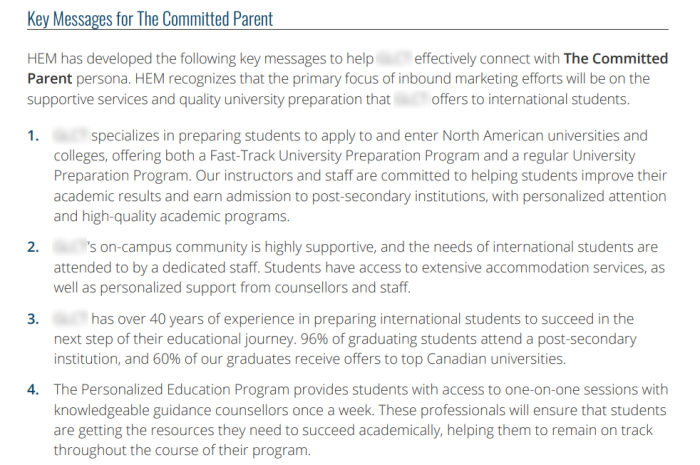
From here, you can cultivate your school brand and its marketing strategy—including its SEO efforts—to boost online inquiries and drive student recruitment. With a solid persona, you can leverage SEO for private schools to position yourself as the preferred solution to your prospects’ education needs. You can optimize your content and website to reach the right target and influencer audience, boosting your chances of appearing with a higher ranking in their online search queries.
Behind the Scenes of a Search Engine Query in SEO for Private Schools
For websites to appear in search engine queries, they must be crawled and indexed by the search engine. Essentially, your website needs to be accessible and scannable to Google for it to be ranked on the search engine results page (SERP). By understanding the SEO basics for private schools and applying industry best practices, you can prove to search engines that your website is a credible and high-quality resource—boosting its ranking by providing online users with value.
You can apply different SEO strategies to prove your website’s value in the SERP. One of the key approaches is to start with keyword targeting and link-building, particularly as you develop your content strategy. Both aspects can shape your content strategy and influence your visibility and domain authority—a score used by search engines to estimate a website’s performance in the SERP.
The Value of Keyword Targeting in SEO for Private Schools
Every search engine query begins with a keyword. Knowing which high-volume keywords prospective parents will use can help you rank higher than your competition, allowing you to tailor your content to appear under relevant searches. In doing so, you can ensure that your school’s search results seem to prospective parents as they seek out private schools during their research.
Example: Prospective parents typing “international private school Lausanne” into Google will come across various links, one of which includes the International School of Lausanne. The words used in the search query are in the website title and the meta description (in bold). The page content also seems optimized to match the user intent, contributing to its high rank:

Integrating keywords into your content and aligning it with user intent is a strong SEO strategy for private schools. You can use various online tools to help you determine the right keywords to target. Generally, you’ll want to focus on search volume, traffic potential, and keyword difficulty—targeting a mixture of lucrative and niche-specific keywords to maximize your efforts.
Although it may take time to rank for certain keywords, it’s worth noting that these efforts make up an essential part of SEO for private schools. These keywords are critical to boosting your content ranking and website visibility in the search engine, ultimately enabling interested parents to find your school as they navigate the awareness stage of the enrolment journey.
Are you interested in honing your SEO strategy? Our team of industry experts can help your private school determine the right keywords to level up your SEO efforts. Through our in-depth analysis, you can also compare how well your private school performs to competitors regarding ranking for these keywords and appealing to prospective parents.
The image below shows an excerpt of a competitive ranking analysis designed to help a private school evaluate its performance. This can also help the school determine which keywords to focus on to appear among its competitors’ search results.

The Role of a Strong Link-Building Strategy in Education SEO
Link building can best describe gaining hyperlinks that direct users from one website to your own. These hyperlinks, also called backlinks, indicate to search engines that your website is trustworthy, contributing to higher ranking. This off-page SEO strategy can be developed in different ways, some of which include social media awareness and guest blogging.
Parents looking for the perfect private school for their children may turn to third-party websites to discover new options. By guest blogging on those websites, your school can create new content with backlinks that generate traffic to your website. This way, you can improve your domain authority while reaching a bigger audience within your target niche.
Example: In a guest blog, Strathallan School proudly showcases its standout graduates while linking to key pages on its website. Prospective parents looking for schools dedicated to helping their students grow may come across this article and be motivated to learn more about this particular school.
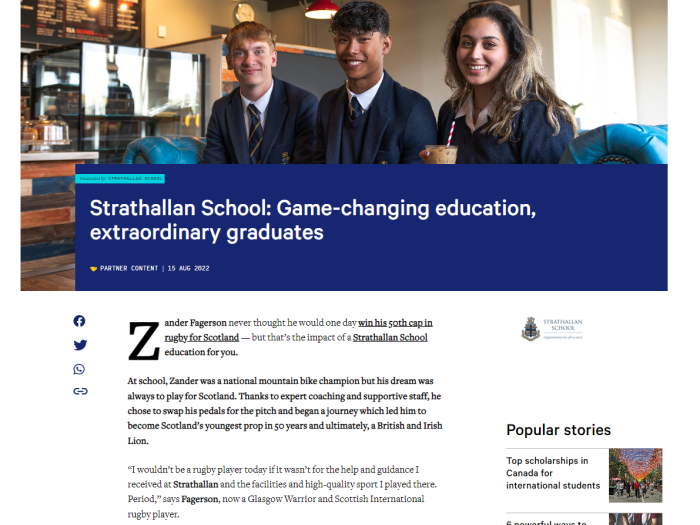
Source: Study International Blog Post
Parents will also likely check reviews and school profiles on third-party websites when searching for the right private school. Listing your institution on a platform dedicated to connecting schools with prospective families can help your SEO efforts. By setting up a profile and adding backlinks, you can make it easy for prospective parents to find and access key pages on your site.
Example: Through its high-ranking profile on Niche, Phillips Academy Andover can generate traffic to its official website. Parents who discover the school on this platform can click the hyperlinks to learn more or enroll on the official website.
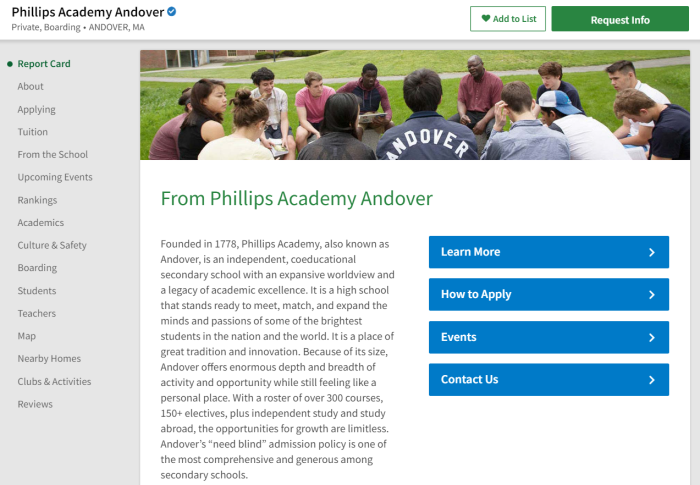
Source: Niche
Taking this approach with SEO for private schools can help boost your awareness, making your school more discoverable to prospective parents. By featuring reviews and photos, you can also use this approach to engage them and push them further down the admissions funnel.
Incorporate SEO Strategies On Your Private School’s Website
Effective SEO strategies for private schools focus on web optimization, which centers on improving the website’s content and performance. Here, SEO-driven content can address your parent persona’s motivations and concerns, using keywords to help boost your search engine ranking. Paired with good performance, your website can create a positive user experience that keeps visitors returning. Your website’s rising traffic and popularity can contribute to your increasing ranking, proving to search engines that your website provides value.
In the context of parent research, this makes it possible for parents to access valuable and relevant content through a natural and user-friendly process.
Use Targeted Content and On-Page SEO to Highlight Your Unique Value Proposition
Parent personas are particularly handy when creating SEO-driven content for your private school. The trick is to integrate key messages from your persona strategy into your content, all while using on-page SEO techniques to boost its visibility in the search engine. This technique lets you showcase your unique value proposition and boost organic traffic to your website.
Your focus here will be on keywords. For instance, you’ll need to ensure that each blog post you create is optimized for a specific keyword in the meta description, title, subtitles, and throughout the article. Image alt tags and relevant internal and external links must also be created.
Example: In a blog post, The Bishop Strachan School highlights how it works to foster independence in students. The keyword “boarding school for girls” is used in the article’s title and body.

Scrolling further down, we can also see this keyword is used in the subtitle (H2 tag):
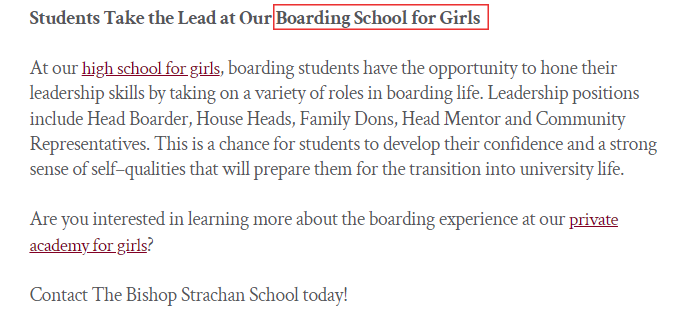
Source: The Bishop Strachan School
The blog post also contains internal links and a call to action to inspire parents to learn more about the school. Using this SEO technique for private schools can help you develop powerful, more visible content for your audience, resonating with them more strongly.
Pro Tip: When brainstorming blog post topics, consider aiming for timeless content that will help you generate website traffic for years. That is one of the key benefits of investing in well-thought-through SEO. This type of evergreen content can boost your ROI, enabling you to provide your target audience with continuous value in a way that strengthens your SEO efforts.
Technical SEO Strategies to Apply in SEO for Private Schools
Technical SEO is all about improving your performance. This way, users visit your site and get what they want through a pleasant, user-friendly experience. The easier it is for them to find the information they’re looking for, the lower the bounce rate (the percentage of users who leave a website after viewing only one page and taking no action). With a low bounce rate, you can prove to search engines that your website delivers value.
There are many contributing factors to a high-performing website. Here, page speed and mobile friendliness are key aspects. Google has online tools to help you quickly assess your private school website’s performance: PageSpeed Insights and the Mobile-Friendly Test.
By using these tools, you can uncover valuable information that can help you improve the user experience on your website. For instance, the PageSpeed Insights tool offers additional recommendations in order of priority. The results vary from one website to another, but they can look similar to this:
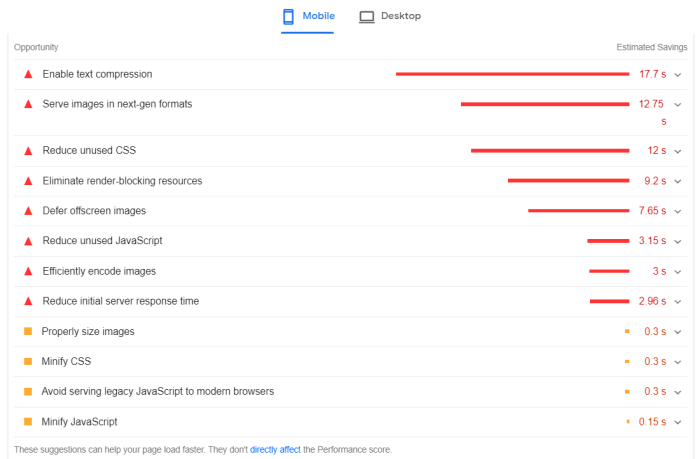
In addition to a faster website, you’ll want to ensure that your private school website doesn’t contain broken links or duplicate content. Not only would this frustrate parents seeking to learn more about your school, but it would also harm your SEO ranking. Broken links indicate that a website may be outdated, and duplicate content can confuse Google as it attempts to sort your content on the results page.
Another key component of technical SEO for private schools is structured data. This type of data is designed to help Google better understand your content. Doing so makes your website more visible within search features, leading to rich results that can boost your discoverability and traffic. In fact, according to the Search Engine Journal, implementing structured data has helped a company reach 160% growth in impressions and 150% growth in clicks for their Answer center.
Since parent research is done heavily online, having rich results within the search engine results page can make your school stand out. This increases the likelihood of parents noticing your website and lets them browse key information before clicking on your link.
The image below shows how structured data can look on the search engine results page. Unlike a typical listing, the link here includes additional information beyond a simple meta description. Here, users can view top questions and answers without opening the website:
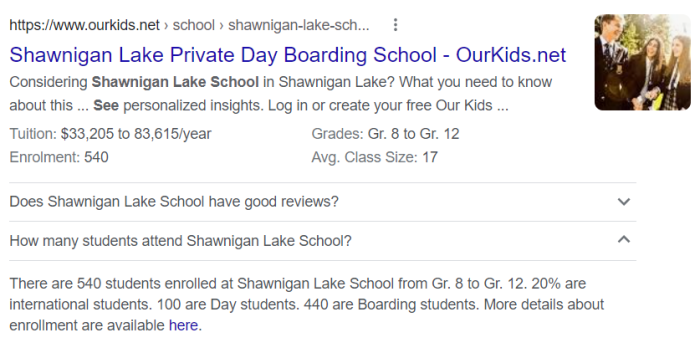
Private schools can use this approach with their content, selecting common FAQs to feature in search engine results. Making this information more accessible can intrigue prospective parents and keep their attention fixed on your content instead of your competitors’ content.
Improve Your School’s Local SEO Efforts to Boost Awareness
Parents are likely looking up private schools based on their location. For this reason, it’s important to set up local SEO, a strategy used to help you become more visible in local search results. To get started, aim to target local keywords and use them when creating localized web content.
Another key must-have is to set up a Google Business Profile for your private school. It’s this profile that often appears in localized searches on Google as well as in the open graph on the right-hand side. Google Business Profile is incredibly competitive, so optimizing your profile should be a priority. You can add your private school’s name, address, telephone number, and website here. You can also share high-quality images to better appeal to your audience.
Example: Parents searching for “private schools in Vancouver” come across different local listings from Google Business Profile. At first glance, parents can see the school, its address and phone number, opening hours, as well as reviews:
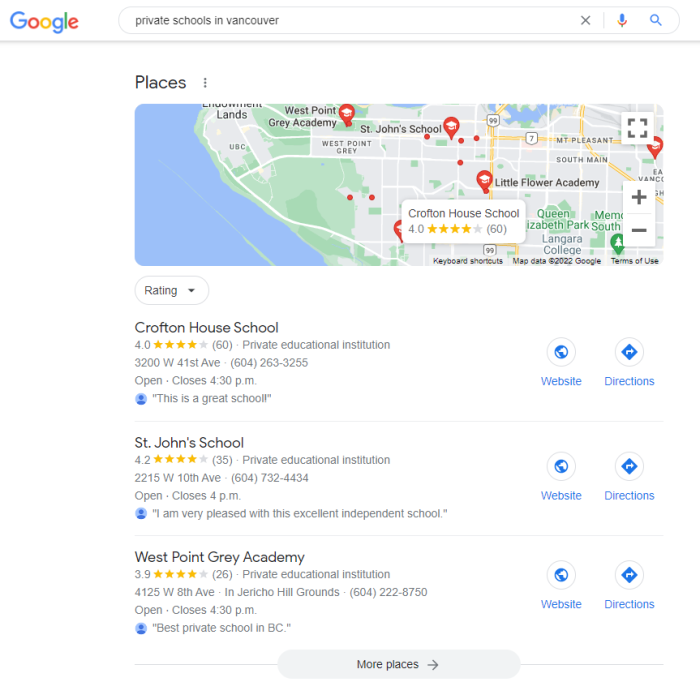
When clicking on a specific profile, parents can read a summary about the school and view various images. Scrolling further down, they can read reviews and discover the school’s social media accounts:


This information makes it easier for parents to explore your school further and discover your community and campus. Positive reviews can also encourage them to engage with your school, driving them one step closer to enrolling their children.
Conduct an SEO Audit to Optimize Your School’s Efforts
SEO standards and best practices are constantly changing, and it’s important to regularly review your performance to find ways to improve your efforts. You can set up Google Analytics to monitor the impact of your SEO and other marketing initiatives. To take things a step further and assess your website performance, you can conduct an SEO audit.
It’s also worth noting that persona needs to change over time, which can impact SEO strategies for private schools—namely, content and keyword targeting strategies. One way to counteract the consequences is to ensure that you’re always prioritizing the needs of your target persona and delivering a positive user experience. By embracing SEO for private schools and making your web content more accessible, you can continue to generate ongoing benefits that support your recruitment efforts behind the scenes.
FAQ To Consider
What is an SEO strategy for education?
SEO standards and best practices are constantly changing, and it’s important to regularly review your performance for ways to improve your efforts. You can set up Google Analytics to monitor the impact of your SEO and other marketing initiatives. To take things a step further and assess your website performance, you can conduct an SEO audit.







